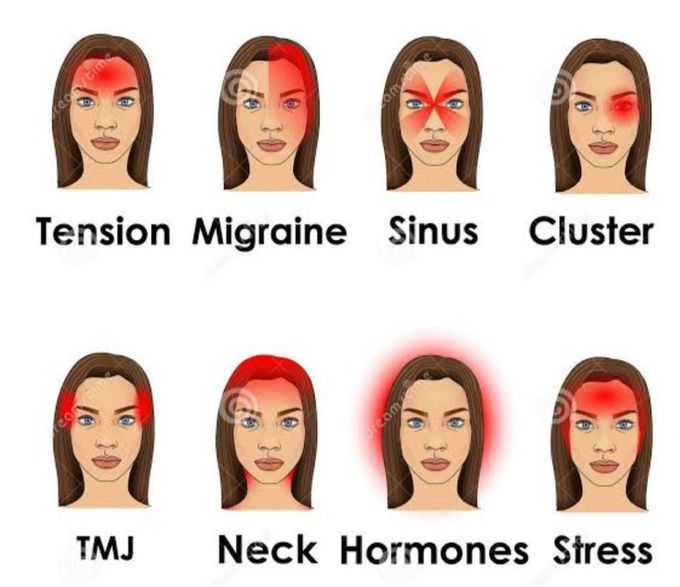


Types of headaches 🤯
There are over 150 types of headaches, but the most common types include:👀 A migraine headache✍️ is a primary headache disorder characterized by recurrent headaches that are moderate to severe. Typically, the headaches affect one half of the head, are pulsating in nature, and last from a few hours to 3 days⌚. Associated symptoms may include nausea, vomiting, and sensitivity to light, sound, or smell. A hypertension headache✍️ The headache pain tends to pulsate and often gets worse with physical activity. According to the authors, high blood pressure can cause headaches because it affects the blood-brain barrier. Hypertension can result in excess pressure on the brain, which can cause blood to leak from the blood vessels in this organ.💣 A stress headache✍️ Tension headaches are dull pain, tightness, or pressure around your forehead or the back of your head and neck. Some people say it feels like a clamp squeezing the skull. Often called stress headaches, they're the most common type for adults.👨👩 A cluster headache✍️ Symptoms of Cluster Headache.Cluster headache consists of severe headaches on one side of the head. It is associated with symptoms that occur on the same side of the head that the pain is taking place on, and which can include red or teary eye, runny or stuffy nostril, and flushing or sweating of the face👤. A sinus headache✍️ Your sinuses are air-filled spaces inside your forehead, cheekbones, and behind the bridge of your nose. When they get inflamed -- usually because of an allergic reaction or an infection -- they swell, make more mucus, and the channels that drain them can get blocked. The build-up of pressure in your sinuses causes pain that feels like a headache.🙍 A hormonal headache✍️ Hormone levels change during the menstrual cycle, pregnancy🤰, and menopause👵, and are also affected by oral contraceptives💊 and hormone replacement therapies. A variety of medications and other treatments are used to relieve headaches. Women who experience hormonal headaches often find relief during pregnancy or upon reaching menopause. TMj headache ✍️ The muscles of the TMJ💪(temporomandibular joint),run along your jaw and cheeks, and sometimes these muscles can cause pain — even headaches. When the muscles in your jaw tense up — like when you grind your teeth — the pain can spread to other TMJ muscles alongside your cheeks and on the sides and top of your head, causing a headache. A neck headache ✍️ Neck pain and headaches are often connected because a stiff neck, herniated cervical disc, or irritated spinal nerves can cause headaches.Headaches that result from neck discomfort or neck injury are called cervicogenic headaches. ... For example, turning your head from side to side could aggravate the headache.✌️

